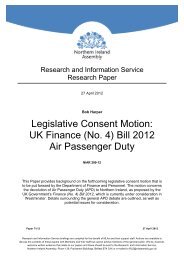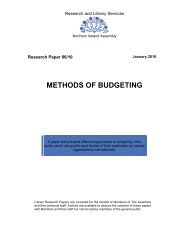Written Answers to Questions - Northern Ireland Assembly
Written Answers to Questions - Northern Ireland Assembly
Written Answers to Questions - Northern Ireland Assembly
Create successful ePaper yourself
Turn your PDF publications into a flip-book with our unique Google optimized e-Paper software.
Friday 20 July 2012 <strong>Written</strong> <strong>Answers</strong><br />
Mr Attwood: It is my intention <strong>to</strong> bring forward a new and updated <strong>to</strong>wn centre and retail planning<br />
policy <strong>to</strong> address the real issues that are self - evident. I also intend <strong>to</strong> take the difficult decisions<br />
required for the numerous major retail planning applications currently in the system throughout the North.<br />
Town Centre Retail Planning Policy<br />
Ms Lo asked the Minister of the Environment, in light of the <strong>Northern</strong> <strong>Ireland</strong> Independent Retail Trade<br />
Association’s recommendation for a five-year mora<strong>to</strong>rium on out-of-<strong>to</strong>wn supers<strong>to</strong>re developments,<br />
whether he intends <strong>to</strong> introduce a Town Centre Retail Planning Policy, which builds upon draft PPS 5.<br />
(AQW 12837/11-15)<br />
Mr Attwood: It is my ambition <strong>to</strong> bring forward a new planning policy for <strong>to</strong>wn centres and retailing.<br />
As part of this process I will take account of the content of existing draft PPS 5, policy and practice in<br />
other jurisdictions and the current evidential context. It is my view that there is a need <strong>to</strong> reconfigure<br />
planning policy <strong>to</strong> recognise more fully the need of in <strong>to</strong>wn retail.<br />
Environmental Impact Assessment (EIA) Regulations<br />
Mr McCartney asked the Minister of the Environment whether, under Environmental Impact Assessment<br />
(EIA) Regulations, a development that is subject <strong>to</strong> an EIA determination, and is amended <strong>to</strong> include<br />
further development, should be the subject of a revised EIA determination.<br />
(AQW 12843/11-15)<br />
Mr Attwood: Amendments <strong>to</strong> planning applications are a common feature of the development<br />
management process. The Department has discretion <strong>to</strong> accept amendments but in exercising this<br />
discretion it must come <strong>to</strong> a decision as <strong>to</strong> whether or not an amendment is so substantial as <strong>to</strong><br />
constitute a different application and thus involves the making of a new application. A fundamental<br />
principle is that the interests of the public must be fully protected when an amendment is under<br />
consideration.<br />
In accepting amendments during the processing of an application, care is taken not <strong>to</strong> prejudice the<br />
rights of others <strong>to</strong> make comments, therefore any material changes are re-advertised, re-neighbour<br />
notified and objec<strong>to</strong>rs advised. New consultations are carried out if necessary.<br />
DOE Planning has a general responsibility <strong>to</strong> consider the environmental implications of developments<br />
which are subject <strong>to</strong> planning control and the environmental impact of any amendment <strong>to</strong> a proposal<br />
will be considered.<br />
Environmental Impact Assessment (EIA) Directive<br />
Mr McCartney asked the Minister of the Environment whether his Department would be in breach of<br />
the Environmental Impact Assessment (EIA) Directive, if it determined that an environmental statement<br />
was not required without having first carried out an EIA determination on a development.<br />
(AQW 12844/11-15)<br />
Mr Attwood: It falls <strong>to</strong> DOE Planning <strong>to</strong> consider whether a proposed development requires EIA. For<br />
this purpose it is first necessary <strong>to</strong> consider whether the development is described in Schedule 1 or<br />
Schedule 2 <strong>to</strong> The Planning (Environmental Impact Assessment) Regulations (<strong>Northern</strong> <strong>Ireland</strong>) 2012<br />
(the Regulations).<br />
Development of a type listed in Schedule 1 always requires EIA.<br />
Development of a type listed in Schedule 2 requires EIA if it is likely <strong>to</strong> have significant effects on the<br />
environment by virtue of fac<strong>to</strong>rs such as size, nature and location. DOE Planning must screen every<br />
application for Schedule 2 development in order <strong>to</strong> determine whether or not EIA is required.<br />
Applications for planning permission for which EIA is required are referred <strong>to</strong> in the Regulations as EIA<br />
applications.<br />
WA 517






